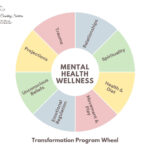Have you ever noticed a connection between what you eat and how you feel? Maybe a sugary treat gives you a quick boost, only to leave you feeling drained and irritable later. Or perhaps those processed snacks seem comforting now, but they don’t do much to lift your spirits in the long run.
I’ve seen and witnessed firsthand how the food we put into our bodies can significantly impact our mental health. And as women in our 30s, 40s, and beyond, understanding this connection becomes even more crucial.
The Not-So-Sweet Truth About Sugar
Let’s talk about refined sugar – that sneaky little devil that seems to be in everything! While a little indulgence here and there is okay, consistently high sugar intake can wreak havoc on our moods and energy levels.
Here’s the science behind it:
- Blood Sugar Rollercoaster: Sugar causes rapid spikes and crashes in blood sugar, leaving us feeling anxious, moody, and fatigued.
- Inflammation: A diet high in sugar can trigger inflammation throughout the body, which has been linked to depression and other mental health issues.
- Gut Health: Sugar feeds the “bad” bacteria in our gut, disrupting the delicate balance that supports healthy brain function.
- Neurotransmitter Imbalance: Research suggests that sugar can interfere with the production and function of neurotransmitters like dopamine and serotonin, which play a crucial role in mood regulation.
- Addiction: Sugar can be addictive, leading to cravings and withdrawal symptoms, further impacting our mental well-being. A study published in the journal PLOS ONE found that sugar can be more addictive than cocaine in rats (Lenoir et al., 2007).
Processed Foods: The Silent Mood Saboteurs
Processed foods are often loaded with sugar, unhealthy fats, and artificial ingredients, making them a triple threat to our mental well-being. These foods can lead to nutrient deficiencies, impair gut health, and contribute to inflammation, all of which can negatively impact our mood and mental clarity.
Nourishing Your Mind and Body
Now for the good news: By making simple changes to your diet, you can take significant steps toward better mental health. Here are some tips to get you started:
- Prioritize Whole Foods: Fill your plate with fruits, vegetables, whole grains, lean protein, and healthy fats. These foods provide the nutrients your brain needs to thrive.
- Limit Sugar: Cut back on sugary drinks, desserts, and processed snacks. Read labels carefully and be mindful of hidden sugars.
- Cook at Home: Preparing your meals gives you control over the ingredients and helps you avoid processed foods.
- Stay Hydrated: Drink plenty of water throughout the day to support overall health and mental clarity.
- Listen to Your Body: Pay attention to how different foods make you feel. Notice if certain foods trigger mood swings or energy slumps.
Remember, it’s not about perfection but progress. Small, consistent changes can lead to significant improvements in your mood, energy, and overall well-being.
As a life coach, I encourage you to explore the connection between your diet and your mental health. By nourishing your body with healthy, whole foods, you can empower yourself to live a happier, healthier life.
Reference:
Lenoir, M., Serre, F., Cantin, L., & Ahmed, S. H. (2007). Intense Sweetness Surpasses Cocaine Reward. PLOS ONE, 2(8), e698. https://doi.org/10.1371/journal.pone.0000698







